The Medical Director at the Sir Lester Bird Medical Centre, Dr Shivon Belle-Jarvis, called for greater awareness and earlier intervention for children with autism during an interview marking World Autism Awareness Day observed annually on April 2.
During an interview on Observer AM, Dr Belle-Jarvis explained that autism involves “a difference in the way that the brain develops and functions”, resulting in challenges with communication, social interaction, and repetitive behaviours.
She noted that, internationally, autism affects one in every 36 children with boys four times more likely to be diagnosed than girls.
While national statistics for Antigua and Barbuda are unavailable, Dr Belle-Jarvis revealed concerning local trends from the medical centre’s outreach initiative.
“Out of 10 children that we’ve seen with concerns, seven out of 10 of those children are actually diagnosed with autism,” she said, referring to children referred for speech or behavioural assessment.
Dr Belle-Jarvis emphasized the importance of recognizing early warning signs, including limited babbling by 12 months, inability to combine two words by age two, avoidance of eye contact, sensitivity to sounds or textures, and lost language development.
She urged parents to seek professional help rather than adopting a “watch and wait” approach.
“Early intervention has been proven to be the key to better outcomes,” Belle-Jarvis stated, recommending regular wellness checks where healthcare providers can conduct developmental assessments.
She identified several local resources for autism assessment, including private pediatricians, the Browne’s Avenue district clinic with public pediatrician Dr Joycelyn Walter Thomas, the Speech and Language Pathology Clinic at Sir Lester Bird Medical Centre, and CHATS (Caribbean Haven for Autism and Special needs Trust Society).
Despite these resources, Belle-Jarvis acknowledged that Antigua and Barbuda remains “far away from where we need to be” regarding autism acceptance and support.
She cited continued problems with isolation, stigma, and inequality, noting that children with autism often face school exclusion, inappropriate discipline, or being labelled as “rude”.
When asked later about the hospital’s approach to autism awareness, Dr Belle-Jarvis explained that their focus has evolved beyond traditional campaigns to emphasize both awareness and acceptance.
While staff participated in the “Light It Up Blue” campaign, the doctor acknowledged the ongoing discussions within the autism community about certain symbols and campaigns that have become controversial due to their associations.
Alternative approaches such as the “Light It Up Gold” or “Light It Up Red” campaigns, the infinity symbol, and the sunflower lanyard used for invisible disabilities were noted as potential options that some advocates prefer.
Dr Belle-Jarvis emphasized that these discussions, while important, should not distract from addressing the fundamental needs of individuals with autism.
“The need for support and the need for inclusion” remain the primary focus, she stated.
She also highlighted that the three main centres serving children with autism — ABLE Centre, Victory Centre, and Adele School — have “far outstripped their capacity,” calling for expanded educational facilities with specialized teachers and greater employment opportunities for those with autism.




